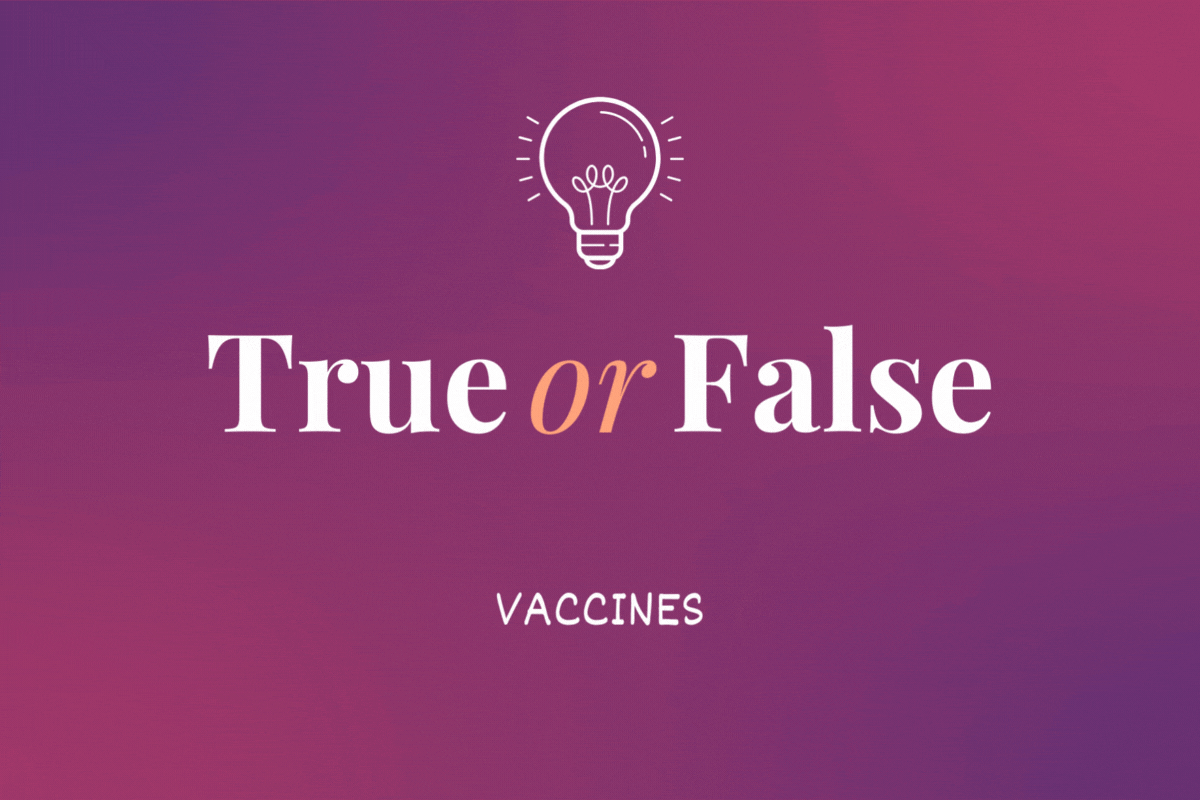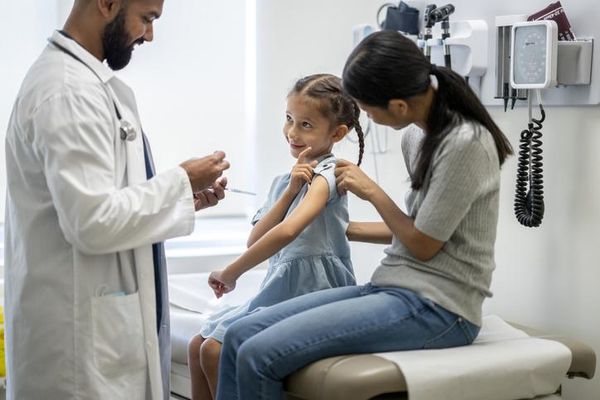Reviewed by Sabra Klein, PhD
As COVID-19 vaccines make their way into the arms of the most vulnerable Americans, those of us toward the back of the line have time to make decisions about our vaccination plans. It's important to be informed about what vaccines offer, so you can be ready to speak up for what you need.
Since people's confidence is a key factor in the success of the COVID-19 and many other vaccine programs, healthcare providers (HCPs), policymakers and organizations like HealthyWomen must educate individuals to ensure that they are able to make the best, most-informed decisions possible.
The COVID-19 vaccine is one of the vaccines, like those for polio, measles, mumps and rubella, that is recommended for everyone who is old enough to receive it. But not all vaccines are blanket recommended. For some — specifically HPV, meningitis B, hepatitis B, and one of the pneumococcal vaccines (PCV13/Prevnar 13) — individuals play a key role in the decision-making process, in consultation with their HCP. This collaborative process, where HCPs involve their patients and incorporate patient preferences into clinical decisions, is called shared decision-making.
When done well, shared decision-making can result in individuals feeling more satisfied with their overall healthcare experiences. But people often don't know they have a say or don't feel comfortable asking questions or voicing concerns, and not all HCPs take the time — or have the training — to effectively engage with their patients. HCPs may fail to initiate conversation with their patients or listen to their patients' concerns. In fact, a body of research notes that women and people of color often feel their voices are overlooked by HCPs. In such cases, patients can suffer worse health outcomes compared with patients who feel their HCP engaged them effectively in the decision-making.
People need to know they have choices and can advocate for what they feel is best for themselves and their loved ones. In fact, it's a good idea to speak up and ask questions and not wait for your HCP to initiate the conversation. HCPs should welcome these conversations, answer their patients' questions and provide them with up-to-date information. This type of shared decision-making would likely improve vaccination rates and save lives.
Examples of shared decision-making
One example of a vaccine that requires shared decision-making for a specific age group is the HPV vaccine, which reduces cancer-causing infections and precancers. The HPV vaccine is recommended for boys and girls 11 to 12 years of age and as a catch-up vaccine through age 26. In 2018, the U.S. Food and Drug Administration approved expanded use of the HPV vaccine for adults ages 27 to 45. In turn, the Centers for Disease Control and Prevention's Advisory Committee on Immunization Practices (ACIP) — the group that makes vaccine recommendations for the United States — recommended shared decision-making for the HPV vaccine among 27- to 45-year-olds so decisions would be made on an individual basis. This decision was based on the fact that the vaccine has less impact on an older population more likely to already have been exposed to HPV.
Pneumococcal vaccines are also important for women and are another example where shared decision-making is recommended. These vaccines are designed to protect people from pneumococcal disease, which increases risk of death as people age. Though more men get pneumonia, more women die from it. Despite evidence that pneumococcal vaccines are 60% to 70% effective in preventing invasive disease in older adults and are even more effective in older women, only 68.9% of adults over 65 got vaccinated in 2018. People of color get sick from pneumococcal disease at higher rates than whites but are less likely to get the vaccine.
Two pneumococcal vaccines, PCV13/Prevnar 13 and PPSV23/Pneumovax 23, were both previously recommended as routine vaccinations for adults ages 65 and older. In 2019, ACIP changed its recommendation to shared decision-making for the PCV13 for adults 65 and older, while continuing to recommend PPSV23 as a routine vaccine. ACIP argued that the disease strains covered by PCV13 are generally low thanks largely to widespread childhood vaccinations. With less disease in the community, infection risks to older people are lower, which makes the PCV13 vaccine less critical as a routine vaccine for adults 65 and older.
However, the PCV13 vaccine is safe and effective and still may benefit specific individuals. In addition to adults with certain conditions, people who live in nursing homes, other long-term care facilities or in areas with low vaccine rates among children and those with chronic heart, lung or liver disease, diabetes or alcoholism may benefit from PCV-13 vaccination. If shared decision-making conversations don't happen or don't happen effectively, patients may only get PPSV23 and, since the PCV13 vaccine should come before the PPSV23 vaccine, they miss the opportunity to get both pneumococcal vaccines if needed.
HCPs and public health experts should be ensuring more people have access to all appropriate vaccines, not making vaccination more complicated. To the extent shared decision-making improves patients' understanding of their options and elevates patient voices in these decisions, it's a good thing. But, if shared decision-making creates confusion or hassle, it could keep people from embracing vaccines and the protection it provides to them, their families and their communities.
Your role in shared decision-making
Too often, patients are left out of healthcare decisions and may not even know their options. Shared decision-making aims to elevate patient voices, and by providing proper patient education, HCPs can prepare their patients to make the right vaccination choices for themselves.
Individuals also can take steps to be proactive and do what they can to be part of the decision-making regarding their vaccines.
Educate yourself: Vaccine recommendations vary by person. Learn which vaccinations are recommended or encouraged for your age and individual risk factors.
Understand your own risks: If a vaccine is not recommended by default, it may be tempting to assume it doesn't work or you don't need it. In fact, some of these vaccines are simply less likely to show dramatic results across an entire population but might be helpful to you. Speak to your HCP about your individual risks to see what vaccines may be more appropriate for you than for the average person.
Check on your insurance coverage: Most insurance plans cover many vaccines, often at no cost to you if you get the vaccine from an in-network HCP. For example, Medicare Part B covers both doses of the pneumococcal vaccine if you get them from an HCP who participates in Medicare. To avoid surprises, though, check with your insurer or your HCP to make sure the vaccine you're seeking is covered and that you know if any other costs, such as copays for the visit to the HCP, apply. If you don't have health insurance or if you can't afford the cost of a vaccine, check with your local health department to find out where you can get free or low-cost vaccines.
Invite shared decision-making: Be ready if your HCP initiates a conversation about your vaccination needs and preferences. If they don't, proactively ask about which vaccines you should consider at your age and with your risk profile. Ask questions and share your concerns.
If you feel uncomfortable having these conversations, consider asking the question through the patient portal or calling the office before your appointment to let them know you want to talk about vaccines when you get there. Previewing your questions may make it easier to get started.
If you have options, try to find an HCP who respects and welcomes your input. Shared decision-making regarding your vaccinations is not meant to be an obstacle — it's meant to ensure that your health and wellness needs are taken into account.
This resource was created with support from Merck.
- Vaccines that Adults Should - But Don't - Get - HealthyWomen ›
- My Daughter Jamie Lost Her Legs and Fingers in a Ferocious Battle Against Meningitis - HealthyWomen ›
- Fast Facts: What Parents Need to Know About Meningitis B - HealthyWomen ›
- Questions to Ask Your Child’s Healthcare Provider About Meningitis B - HealthyWomen ›
- Why Parents Need to Ask About the Meningitis B Vaccination - HealthyWomen ›







